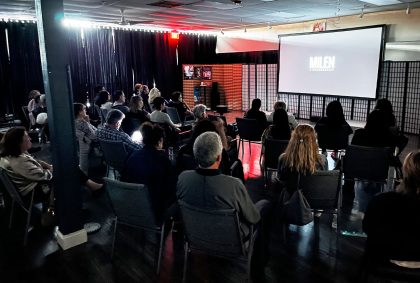‘I Chose To Be Free’
Woman opens up about her
resurrection after years spent
as ‘one of the living dead’
be Emma-Kate Symons, The New York Times
Henda Ayari, 40, is a true survivor — but survival is not enough. She’s fighting for change and has taken her agenda straight to the new president of France
A French Muslim woman who fled a violent marriage with an extremist and threw off her full veil and headscarf in solidarity with terrorism victims has transformed herself into a high-profile campaigner against hardline Saudi and Qatar-style Islam.
Henda Ayari, a mother of three, author and women’s activist wrote a widely shared open letter to President Emmanuel Macron urging him to take far tougher measures against radical Islamic propaganda — and at the same time help to reintegrate the moms and kids who are most isolated and hurt by it rather than punishing them.
The daughter of a Tunisian mother and an Algerian father, Ayari was raised in Normandy as a non-practicing Muslim. When she was 21, in a search for identity, Ayari was lured into a French Salafist sect tied to Saudi Arabia. Her new masters obliged her to don the head and neck to toe body-covering veil and tunic known as the jilbab, and sometimes she wore the niqab, which only leaves slits for eyes. She rapidly followed orders to quit university, enter an arranged marriage and immediately procreate with a hand-picked “brother.”
“I was one of the living dead. Salafism anaesthetized me until I freed myself from its mental chains,” Ayari told Women in the World in an interview in Paris.
“I was taught that society was sheytan — the devil — and that music and dancing were evil. We Muslims were the victims of a Zionist-American conspiracy, and I had to bring up good little Salafists if I wanted to go to paradise. I was cut off from my old friends and family and programmed to stay at home, and bring up children who were to be indoctrinated with hate of the other — against France and the French, the West, against Jews, against Christians, and all Muslims who didn’t follow our rules.”
During her period of radicalization and as she later searched for alternatives to Salafism, Ayari also frequented France’s Muslim Brotherhood movement. Today she is a prominent campaigner raising public awareness about various strands of Islamist fundamentalism and helping women who, like her, have escaped from violent relationships in separatist Muslim communities.
In the end Ayari said it was her years of education inside the secular French school system that supplied her with the critical faculties to rise up against her brainwashers. Inspired by the powerful reactions to her unveiling on Facebook after the Paris November 2015 terror attacks, showing her “before” photographs in her jilbab (leaving only the eyes to the chin visible) and “after” shots in carefree in light clothing minus any head-covering, she wrote an autobiography titled I Chose to be Free.

A before-and-after photo Henda Ayari posted on Facebook showing her wearing a jilbab and then after she escaped an Islamist sect.
“The Bataclan and other attacks came like an electric shock for me,” she said. “I knew straight away that my ex-husband who had told me to hate ‘miscreants’ must be so happy. I didn’t want to represent any more this ideology that led to the massacre of all these innocent people.”
Her widely praised confessional autobiography, released last year, charts Ayari’s difficult journey as an escapee from the draconian 7th century Sunni Salafi version of Islam, which demands women cover themselves to the point of being almost invisible, stoning for adultery, death penalty for homosexuals, and incitements to violence against “miscreants,” “infidels” and “apostates.”
Ayari set up an association to aid single mothers who like her find themselves “repudiated” — forcibly divorced and in jeopardy without resources by their husbands when they finally leave what Ayari describes as “parallel societies.” Her activism and media campaigning have earned her multiple death threats and online abuse including from some fellow Muslims who call her — a Muslim woman of North African heritage — Islamophobic, racist and a traitor. Since the release of her book, her family has refused to even speak with her, she said.
“Because my journey to the center of hell is the same as far too many women, imprisoned in their veils, victims of the perversity of religious sectarian organizations that are destroying them, I decided to create ‘Liberatrices’ (Liberators) to fight against discrimination and radicalization and help women in difficulty,” she said.
The official religion in countries like Saudi Arabia and Qatar, Wahhabi Salafism in its most extreme forms inspired the jihadist theology of Islamic State. But it is also popular among a growing minority of ultra-conservative Muslims worldwide — like Ayari’s ex-husband, a man designated as a radicalization risk by French law enforcement and who told her jihad was his duty.
As she recounts in her autobiography, with its harrowing accounts of a traumatic childhood overshadowed by her cousin’s attempted rape of her at age 9 when she was on holiday in Tunisia, and constant beatings from her mother, he spent most of his marriage with Ayari at the local mosque, with other Salafists. Her husband lived mostly off public assistance that he then used to finance a family trip to Mecca. Today, Ayari blames him for influencing their older son, who has also threatened his mother for not wearing the veil and being a “prostitute.” The connection between the misogyny and hateful ideas underpinning Salafist ideology and terrorism is clear, Ayari argues.
“Even if Salafists now claim they are just another pious, non-violent religious grouping, and declare they are the enemies of ISIS, they represent for me the anti-chamber of terrorism,” Ayari said. “Why? Because their ideas cannot be reconciled with democracy. I was imprisoned by this ideology, and it took me years to free myself from it.”
ENTERING THE SALAFIST SECT
Shimmering in a white dress, arms bare and long hair flowing freely, Ayari gives no hint of her cloistered, violent past and how she ended championing the rights of women caught up in what she calls a “dangerous sect.”
The author and women’s activist is taking the microphone at a Paris panel debate organized by one of France’s leading opinion journals discussing the nation and Europe’s future in the wake of the Macron election win. In a calm confident voice she tells her dramatic story, of taking her three children and fleeing an abusive marriage. Her religious zealot husband beat her if she didn’t wear the long flowing jilbab veil in the darkest of colors leaving only a small triangle exposing her eyes and mouth. According to him, France was a hateful, anti-Muslim country filled with “kuffars,” or infidels.
Now 40, Ayari says she was actively recruited into the most extreme form of Islamic religious practice in her late teens when she became friendly with a group of zealous Muslim “sisters” at university.
She quickly fell under their spell, started wearing the veil, then met their Salafi religious advisers. It was at their urging that she stopped going to university so she could marry an ultra-orthodox Muslim they set her up with from Tunisia when she was only 21.
Her spouse quickly demonstrated violent tendencies and she soon found herself confined mostly to her home, except when she did the supermarket shopping or attended Salafist gatherings, wearing a dark covered jilbab, to hear preachers and imams. She was forbidden to work and had to bear three young children in an atmosphere of constant verbal and physical abuse. “The day after we married he changed. He even said I was a prisoner. He often became violent because I wasn’t ‘submissive enough’ … I had to wear the jilbab and sometimes I wore the niqab.”
During her decade of marriage, Ayari was based in Roanne, one of France’s most notorious hotbeds for Salafist proselytism and a leading exporter of ISIS jihadist terrorists including Rachid Kassim. The operative since killed in Western strikes in Syria and Iraq is believed to have remotely directed a series of last summer’s terrorist attacks in France, including the stabbing murder of a police officer couple outside Paris and the beheading of a Catholic priest in Normandy, as well as the failed explosion of gas canisters outside Notre Dame cathedral.

Another before-and-after photo of Ayari, this one posted on Twitter showing in a niqab prior to her liberation.
Over the 10 years she lived among some of France’s most radical Muslims, Ayari endured being punched in the stomach while pregnant, and savagely beaten for having prepared a defrosted dish of fish for an ifthar dinner after the fast during Ramadan. She repeatedly pleaded with her in-laws and local imams and Muslim groups to help her, but most told her to be patient despite the constant violence.
Discrimination also came from French law enforcement who shrugged off her attempts to make complaints against her brutal husband. After he took steps to move her family to Saudi Arabia, vowed to put her daughter in a full veil at 7 and threatened to strangle her for having bought a red-colored jilbab, she ran away with their three kids and went into hiding in northern France.
Repudiated by her former partner, Ayari found herself without money or legal status — she had only a religious marriage and thus no civil marriage certificate, and her ex refused to provide child support. Judges awarded custody of her children to her jihadist-sympathizing husband for two years after she was hospitalized with depression, but Ayari eventually won the battle to be reunited with her children.
PETITIONING PRESIDENT MACRON
This summer France has commemorated the one-year anniversary since a wave of deadly terror attacks including the Nice Bastille Day murders of 86 people, and the beheading of Normandy priest Jacques Hamel. But even during the lead-up to the anniversaries, there were terror strikes such as the Champs-Elysees assassination of a French police officer and an assault of another officer in front of Notre Dame, and the killings of French people caught up in the spate of attacks in London. Just this week, police shot and arrested a man who they say intentionally plowed a vehicle into a group of French troops in Paris, injuring at least six.
Ayari believes the only solution is to go back to what she believes are the ideological and sectarian roots of terrorism and especially to mothers who educate children. She spoke to Women in the World about her push to assist single mom escapees from Salafism, who have no civil marriage status, and are abandoned by ex-partners who propose polygamy or move on to other women and families, often taking the children. The campaign earned Ayari lengthy interviews on French national TV and radio, and feature articles and Op-Eds in Le Figaro and Opinion Internationale.

Ayari pictured on the cover of her autobiography, the title of which translates as ‘I Chose To Be Free.’ She says her family has stopped speaking with her since the book was published.
“I wrote to the president and his most senior ministers pleading with them to make the struggle against radical Islam the priority of their priorities — which is after all what French people are asking for,” she said.
“Radicalism is not only spiritual or religious. It is political,” Ayari wrote in her letter in which she argues that political Islam — just like hardline politicized Catholicism or Judaism — is inherently contrary to liberal democratic secular values, and cannot lead to peace and respect for others.
“Fighting against terrorism by increasing intelligence and security is indispensable but it isn’t enough,” Ayari wrote. “We need to put as much effort into eradicating the causes that lead to people committing the crimes of terrorism, or the criminal activities of hundreds of young recruits.”
HELP REINTEGRATE MOTHERS
Ayari — who has agitated in the French media and on social networks for a meeting with Macron arguing that if he can meet with Rihanna and Bono he can find time to meet her — advises law reforms in France. Mothers who leave Salafist and other radical religious communities, and are vulnerable and unemployed, should not be automatically deprived of their children’s custody as she was. Instead, she says they need to be helped with adjusting to the outside world and dealing with their psychological trauma and “handicaps” after having spent years banned from studying or working.
She also proposes French authorities take a different approach than outlawing women from wearing the niqab outlawed in public spaces. Ayari recommends offering them meetings with social workers and psychologists and assistance to get into the workforce rather than to pay fines.
“We have to fight discrimination and radicalization,” she said.
As for the headscarf, Ayari said she has “no problem with women who wear the veil if it is their free choice and they feel fulfilled.”
“But I object to the veil as a symbol of political Islam an ideological standard-bearer or even a so-called symbol of feminism. Feminism should be for everyone — including women who are forced to wear the veil either by law or through cultural and family pressure.”
Countering the propagation of political Islam in the public sphere could also take the path of banning the commercialization and sale of the full niqab or burqa in France, just as has been done in Morocco and Tunisia, Ayari argues. The government could additionally sanction mosques, cultural centers and Muslim associations that act as apologists for Salafism or Muslim Brotherhood ideology.
In her letter to Macron, Ayari finally appealed to the role mothers can play in radicalization and avoiding it in the first place: “It is your responsibility to assure not only the security of citizens, but also their freedom,” Ayari wrote.
“Fight with determination and without compromise against an ideology that is like a gangrene eating away at our most fundamental values, and that reduces women at best to the level of sub-citizen, and at worst to an object, who educates her children in violence and hate of others — which is the real fertile ground that breeds terrorism.”
.







